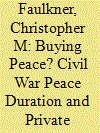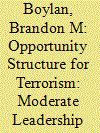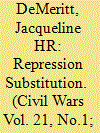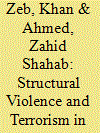| Srl | Item |
| 1 |
ID:
165693


|
|
|
|
|
| Summary/Abstract |
Do Private Military and Security Companies (PMSCs) impact peace duration after civil war? I argue that the role these organisations play in a conflict can impact post-conflict stability. Specifically, I suggest that variance in services provided by PMSCs can influence rebels’ calculations about relative capabilities. These calculations then contribute to the probability for civil war recurrence. Building on the bargaining framework, with a focus on information and commitment problems, this article demonstrates that PMSCs participating in armed combat operations can jeopardise the stability of peace following civil war. Three case narratives (Angola, Sierra Leone and Croatia) are used to probe the theoretical argument and results are illustrative – PMSCs serving as force multipliers contribute to an increase in the probability for conflict recurrence.
|
|
|
|
|
|
|
|
|
|
|
|
|
|
|
|
| 2 |
ID:
165691


|
|
|
|
|
| Summary/Abstract |
This data study provides the first comprehensive empirical overview of organised violence across the Shia and Sunni Muslim divide, 1989–2017. We present a conceptual framework of sectarian dimensions of armed conflicts: sectarian identities; sectarian ideologies; and sectarian alliances. Our analysis demonstrates the extent to which organised violence has been fought across the Shia-Sunni divide. We also explore the sectarian identity dimension in non-state armed conflicts and one-sided violence. Overall, our study shows that most of the organised violence across the Shia-Sunni divide is driven by states, rebel groups, and militias, rather than communities.
|
|
|
|
|
|
|
|
|
|
|
|
|
|
|
|
| 3 |
ID:
165694


|
|
|
|
|
| Summary/Abstract |
Why does terrorist violence escalate from some ethnic groups but not others? According to theoretical insights, many groups endure conditions that should spur on terrorist campaigns, but in reality only some carry them out. In contrast to studies emphasising motivations, this article constructs a framework centred on opportunity structures that contributes to our understanding of the rise of terrorism waged along ethnic lines. It argues that beyond grievances or other motivations, terrorist campaigns develop from communities when moderate political leaders depart from their positions in nationalist movements, causing terrorists to fill the subsequent power vacuum, while little terrorism occurs when leaders do not relinquish the nationalist agenda. This argument is evaluated with evidence from the Tamil and Muslim cases in the context of the Sri Lankan Civil War. Tamil United Liberation Front leaders left the Tamil nationalist movement in the early 1980s, enabling the Liberation Tigers of Tamil Eelam’s rise to dominate the nationalist agenda for three decades, while the Sri Lanka Muslim Congress did not relinquish the Muslim cause, which in part precluded the normalisation of violence in the community.
|
|
|
|
|
|
|
|
|
|
|
|
|
|
|
|
| 4 |
ID:
165695


|
|
|
|
|
| Summary/Abstract |
Does the United Nations naming and shaming of specific violations of human rights decrease government repression? In this article, we argue that international shaming of specific human rights violations can weaken the target government, bringing new challenges and making the government cessation of repression less feasible. When international naming and shaming campaigns target specific repressive tactics, they increase the costs of some – but not all – means of repression. Using original data on naming and shaming by the United Nations Human Rights Council (HRC), we show that the shaming of one physical integrity violation is jointly associated with decreases in that violation and increases in other violations of human rights.
|
|
|
|
|
|
|
|
|
|
|
|
|
|
|
|
| 5 |
ID:
165692


|
|
|
|
|
| Summary/Abstract |
A remarkable feature of the Southern Sudanese liberation movement during the First Sudanese Civil War was its use of anti-colonial discourse and tactics. Soon into their struggle, the Southern Sudanese came to depict their situation as colonisation by the Muslim-Arab elite in Khartoum. As this article argues, this adoption of anti-colonial identity was the outcome of Southern Sudanese interaction with neighbouring Arab and African first-generation liberation movements, through which the future leaders of the Southern Sudanese liberation movement observed and absorbed the practices used against European colonialism. When the Southern Sudanese launched their liberation struggle, these practices shaped their struggle.
|
|
|
|
|
|
|
|
|
|
|
|
|
|
|
|
| 6 |
ID:
165690


|
|
|
|
|
| Summary/Abstract |
The Federally Administered Tribal Areas (FATA) of Pakistan came under the international spotlight following the US-led invasion of Afghanistan in 2001.Mainly due to being a semi-autonomous region where British-colonial-era laws were practised until May 2018, FATA remains one of the most marginalised and insecure areas of Pakistan. Based on Galtung’s structural violence theory, this paper examines the nexus between the region’s socio-economic and political realities and terrorism. Through primary and secondary data, this paper argues that economic marginalisation and the lack of political and individual freedom of the tribal people are root causes of the instability in FATA.
|
|
|
|
|
|
|
|
|
|
|
|
|
|
|
|